- Home
- Kristin Harmel
The Room on Rue Amélie
The Room on Rue Amélie Read online
Thank you for downloading this Simon & Schuster ebook.
* * *
Get a FREE ebook when you join our mailing list. Plus, get updates on new releases, deals, recommended reads, and more from Simon & Schuster. Click below to sign up and see terms and conditions.
CLICK HERE TO SIGN UP
Already a subscriber? Provide your email again so we can register this ebook and send you more of what you like to read. You will continue to receive exclusive offers in your inbox.
To Holly Root, Abby Zidle, and Kristin Dwyer.
All three of you recently made big career decisions and took on new challenges. I’m so proud of you—and so grateful for your professional support and wonderful friendship. I’m so lucky to have you in my life.
And to all of you who have been strong enough to stand up for what you believe in—in the small moments and the large ones. Making the world a better place begins with even the tiniest acts of personal bravery. May you forever hold fast to the courage to follow your heart.
CHAPTER ONE
March 2002
She sleeps beside me, her narrow chest rising and falling, and already I miss her.
The sand in the hourglass is running out, flowing relentlessly toward the end. There’s never enough time, not when a person has become a part of you. We were lucky to survive the war, my wife and I, and not a day passes that I don’t think of those we lost. I know it’s greedy to want just one more week, one more month, one more year with her when we were already given so much time. The last half century has been a gift we never expected, perhaps a gift we never deserved.
Still, I can’t let go. I can’t imagine my world without her, for my life didn’t really begin until the day we met. But I’m as powerless to protect her in this moment as I was all those years ago in Paris, though both then and now I tried to fool myself into believing I had some control.
I rise quietly, careful not to disturb her. When she awakens, the pain will return, so while I yearn for her company, I’m grateful that for now, she’s at peace.
I shuffle into the kitchen, boil water in our electric kettle, steep some Earl Grey tea, and make my way to the front porch. It’s March, so the air is crisp, as crisp as it gets here in Antelope Valley, some sixty miles north of Los Angeles. I stare into the misty morning, and my breath catches in my throat when I see it: the first bloom of the season. In the coming weeks, the fields will turn brilliant shades of yellow, orange, and red. My wife will almost certainly be gone by then, but at least she’ll have this, one last dawn to the poppy season.
“Thank you,” I say, looking upward to where I imagine God must be. “Thank you for this.”
I’ve been talking to God a lot lately, which is strange because during the war I might have argued that He didn’t exist. But in the years since, I’ve surprised myself by slowly wending my way back to faith. It began with our daughter, Nadia, for there’s no denying that she was a miracle. And when she had three healthy children of her own, I believed a little more. When our grandchildren gave us great-grandchildren, and my wife and I were still here, I had no choice but to acknowledge a higher power.
Then again, perhaps I’d known on some level that He was there all along, because what other explanation could there have been for my wife and me finding each other in the midst of such chaos all those years ago?
As I gaze out at the rolling fields, I can see our lives unfolding here, our daughter twirling in the sunlight, our grandchildren chasing each other through the blooms. I sip my tea and blink a few times to clear my vision. It’s embarrassing how emotional I’ve grown lately. Men aren’t supposed to cry, especially men of my generation. But when it comes to the love of my life, I’m powerless against the tide.
I finish my tea and head back into the house to check on her. She should still be sleeping, but I find her in bed with her eyes open, her head tilted toward the door. She’s still beautiful, even in old age, even as she succumbs to the cancer we caught too late. “Good morning, my love,” she says.
“Good morning, my darling girl.” I force a smile.
“Have the poppies bloomed yet?”
I nod, and her eyes fill with tears. I know they’re tears of happiness, and I share her joy. “Just one for now,” I reply. “But the others won’t be far behind.”
“What color, my love? What color is the first one?”
“Red. The first poppy of the season is red.”
“Of course.” She lies back and smiles. “Of course it is.”
When she focuses on me again, we gaze at each other for a long time. Looking into her eyes always washes the decades away and takes me back to the day I first saw her.
“I must ask something of you,” she says softly.
“Yes.” I know what it is before she says the words.
“I want to go to the top of the hill just once more. Please.”
“I will take you.” My strength has waned with time; I had a heart attack last year, and I haven’t felt like myself since. But I knew this would be my darling girl’s last wish, and I will make it come true, whatever it takes. “We can go when you’re ready. But let’s wait a few more days until the poppies are fully in bloom.” Of course, the request is partially a selfish one; I want to give her a reason to hang on a little longer, to stay with me.
She smiles. “Yes, you’re right.” She’s already fading, her eyelids heavy, her gaze growing unfocused. “She should be here, though, not me,” she whispers after a moment. “It always should have been her.” I know exactly who she’s talking about: her best friend, the one who was like a sister to her, the one we lost so senselessly all those years ago.
“God had a plan, my darling.” I can’t say what I really want to, which is that I’m grateful it was my wife who survived. That’s a selfish, terrible thing to think, isn’t it? No one should have died at all. But fate doesn’t always play fair.
“I’ll see her again soon.” Her voice is so faint I can hardly hear her as she adds, “On the other side. Don’t you think I will?”
“Don’t go yet,” I say. “Please.” And as she drifts back to sleep, I sink down into the chair beside her and begin to cry. I don’t know how I’ll live without her. The truth is, since the day I met her, it’s all been for her. My whole life. My whole existence. I don’t know how I’ll say good-bye.
CHAPTER TWO
December 1938
The first time Ruby Henderson saw Marcel Benoit, she knew her life was about to change.
When she wandered into Café Claude on the west side of Central Park on a damp and frigid Thursday afternoon, she’d merely been trying to get warm. It was three days before Christmas, and she still wasn’t accustomed to the Northeast’s icy winters. The penetrating chill wasn’t helping with her homesickness either. She hadn’t been able to afford a ticket back to Southern California for the school break, but perhaps seeing her parents would have made the loneliness worse anyhow. Besides, it had been Ruby herself who had insisted, nearly four years earlier, that leaving her small desert town to study in Manhattan was a good idea. I’m in search of a big life, she had announced with all the confidence she could muster. And I won’t find it in the middle of nowhere.
But now, surrounded by mothers holding the hands of cheerful children in thick coats, and with Christmas carols and the smell of roasting chestnuts in the air, she found herself wishing that she wasn’t so alone. As a few snowflakes began to drift from the graying sky, she looked away from the window, sighed, and turned back to Fitzgerald’s The Beautiful and Damned. She could always find comfort in a good book.
She had just taken a sip of her black coffee when the café door opened, letting in both a great gust of wind and a man in a black woolen coat. He r
emoved his hat, revealing a thick shock of dark hair and chiseled features that reminded her a bit of Cary Grant. Ruby’s breath caught in her throat as she stared at him. There was something about him, something mysterious and magnetic, that made it impossible to look away.
The man’s gaze landed on her, and he smiled, a slow, perfect smile. He made his way, limping slightly, to the table directly opposite hers and sat down, removing his overcoat to reveal a perfectly cut navy suit. “Well, hello,” he said, as if they were sharing a table, as if he’d come there just to meet her. She thought she detected the hint of an accent. He was young, no more than four or five years older than she.
“Hello.” She was trying to sound casual, as if this sort of thing happened to her all the time, but she feared her burning cheeks were giving her away.
“I’m Marcel Benoit.” The way he was looking at her made her feel as if they were the only two people on earth.
“Ruby Henderson.”
“Are you waiting for someone?” Yes, he definitely had an accent, refined and exotic. British, maybe? No, that wasn’t it.
Ruby took a deep breath and said the bravest thing she’d ever said to a man. It was, after all, Christmastime, and she had nothing to lose. “I think perhaps I was waiting for you.”
His smile spread slowly, like syrup. “Well, in that case, may I join you?”
Ruby nodded and he stood, grabbing his coat and hat and taking the seat opposite hers. He smelled like pipe tobacco, sweet and spicy, and up close, she could see two tiny freckles just under his right eye. His eyebrows were thick and dark, and his nose and cheekbones looked as if they’d been cut from marble.
“I was just cursing my luck at being stranded so far from home during the holidays,” he said, holding her gaze. “But now, I think, perhaps it is not so bad.”
“Where are you from?”
“Paris.”
But of course he was. She recognized the accent now, the way he carried himself, the way he was dressed. He was far too stylish to be from anywhere else.
“You’re reading Fitzgerald, I see,” he added. “He is a great fan of my city.”
“Oh, so am I. Not that I’ve ever been. I’ve always dreamed of it, though. All of my favorite writers spent time there, you see. Hemingway. Gertrude Stein. Fitzgerald, of course. What I wouldn’t have given to be a part of their Saturday salons!” She felt suddenly silly; she hadn’t intended to sound so young, so naïve.
But he didn’t seem to notice. “Ah yes, on the rue de Fleurus. I know it well. My father was a patron of Matisse.”
“Henri Matisse? The painter?”
“Yes. He and my father knew each other before the Great War. In fact, he brought my father to Madame Stein’s salon a few times.”
“Is your father an artist?”
“Just an art dealer, I’m afraid. He died a few years ago.”
“I’m very sorry.” A heavy silence settled over them, and Ruby was glad when the waitress interrupted to ask Marcel if there was something he would like. He ordered a cup of black coffee and asked Ruby if she’d like to split a slice of apple pie. As the waitress walked away, Ruby wondered how they had advanced so quickly to the intimacy of sharing a dessert. Not that she minded.
“What are you doing here in New York?” she asked him.
He studied her for a moment. “I thought I was here for business. But now I realize I might be here for another reason entirely.”
“And what is that?”
He leaned forward, locking eyes with her once again. “Perhaps to meet the woman of my dreams.”
THEY WERE MARRIED THAT JUNE in a ceremony at her family’s church in California, just after Ruby completed her degree, and by July, she was living in Paris. Marcel hadn’t mentioned, at first, that his spacious apartment on the rue Amélie, inherited from his parents, had a view of the tip of the Eiffel Tower, or that it was located in the same building as a tiny art gallery called La Ballerine, whose narrow windows were filled with a changing array of beautiful ballet-themed paintings and sculptures made by local artists. He hadn’t told her about the half-blind and entirely deaf Madame Lefèvre, who served rather inefficiently as the building’s concierge, or about the way one could hear church bells echoing through the streets on Sunday mornings, a concerto of beautiful sounds. But these were the details that brought her new world alive.
Her parents hadn’t wanted her to go, but Ruby had already made up her mind. She loved Marcel, and she would make a life with him. That life would be in Paris, at least for now, and though she would miss her parents terribly, she was eager for an adventure, something to stretch the boundaries of the small world she’d known.
“It’s not the size of your world I’m worried about,” her father had said, his face gray, when she told him this a few days before the wedding. “Europe is a powder keg, my dear. I was there for the Great War. The Continent has a short fuse, and all it takes is someone to light it. Hitler, it seems, is holding a match.”
Ruby had shaken her head. After all, she read The New York Times; she understood the politics of Europe. “No, Father. Germany has been appeased. Now that they’ve received the Sudetenland—”
Her father had cut her off. “It won’t be enough.”
She was sure he was being overly cautious. “Don’t worry, Father. I’ll come back to visit very soon.”
He had looked at her for a long time before nodding. “God willing.”
And now Ruby was here, proving her point by living a life of gaiety in the city she’d always dreamed of. She and Marcel drank champagne at the finest cafés, attended the finest parties, wore the finest fashions. His job as an art dealer for the company his father had founded was lucrative and placed them in Paris’s most elite circles. Admittedly, Ruby wasn’t using her education degree, but she was confident she was doing something better: she was soaking up life. When she became a teacher one day, she’d be a better one because of all she was experiencing. Or maybe she was meant to do something else, something extraordinary, here in France. The future was wide open.
Paris certainly didn’t feel like a city on the cusp of war, the way her father had warned, but as the months passed, there was a growing sense that Germany was only playing possum. It made Ruby increasingly uneasy. Could there be some truth to her father’s words after all?
“We are fine,” Marcel said firmly each time Ruby broached the subject. “You should not spend so much time worrying.” He refused to discuss politics with her, which bothered her. Hadn’t he known from the start that she was interested in world affairs? He had said once that it was one of the things he loved about her. But now he seemed to prefer taking her to grand parties and balls, where it had become her role to sparkle quietly on his arm. And though she enjoyed the revelry, she began to feel as if they were merely keeping up a façade. Sometimes, it felt as if the whole city was doing the same.
“I think war is coming whether we want to admit it or not, Marcel,” she said as they made their way home late one waning August night from a ball at the Hôtel Salé on the Right Bank. The elaborate fete had been thrown by an American heiress, and Ruby felt emboldened, having just spent the evening among fellow expatriates who had actually been interested in hearing her opinion. “We can’t just hide our heads in the sand anymore.”
“I would never put you in harm’s way, my darling.” Marcel didn’t look at her.
“But aren’t you concerned? A war would change everything. What if Hitler wants Paris as a feather in his cap?”
Their car pulled down the rue de Grenelle, bringing the shadow of the Eiffel Tower into view. “And what a lovely feather it would be,” Marcel murmured, gazing for a moment at the tower, a ghost against the moonlit sky. “But we won’t let that happen, my dear.”
“Who won’t let it happen? It seems the French government is doing nothing but acquiescing, and the army isn’t ready.” The car turned onto the rue Amélie and drew to a stop.
Marcel got out and opened Ruby’s door fo
r her. “You shouldn’t read so much of things you don’t understand. Don’t you trust me?”
She pressed her lips together. She wanted to tell him that she did understand, that she was smarter than he gave her credit for these days. When had he stopped listening to her? But it was late, her head was spinning from the champagne, and suddenly, she was exhausted. “Of course I trust you,” she said as Marcel held open the grand red door to their building and led the way up the stairs to their first-floor apartment. “It’s Hitler I don’t trust.”
“Well, fortunately,” Marcel said, unlocking their front door, “you are not married to him.”
LESS THAN A MONTH LATER, on the first of September, news arrived that Hitler’s armies had invaded Poland, and that the French army was being mobilized. Two days later, France and their British allies found themselves officially at war with Germany. And though life went on in Paris, the theaters and cafés swelling with people desperate to escape the encroaching reality, there was no longer any denying that darkness was at the gates.
“The Maginot Line will hold,” Parisians repeated again and again, desperation shining in their eyes. Ruby wanted to believe that the fortified borders were safe too. But she’d arrived here having pulled the wool over her own eyes. And now, she knew she had no choice but to stare straight ahead into the future, whether she liked the look of it or not.
CHAPTER THREE
December 1939
Hanukkah came early that year, and it seemed to Charlotte Dacher that perhaps the holiday itself was scrambling to happen faster than it was supposed to. Maybe it, too, was plagued with a dark sense of foreboding about the future.
Papa, of course, called that sort of thinking ridiculous. Hanukkah only seemed early because the twenty-fifth day of Kislev on the Hebrew calendar fell sooner than usual on the calendar the rest of the world used. “Hanukkah never changes,” he said firmly, and Charlotte resisted the urge to make a face, for Papa never seemed to believe that anything changed. In fact, even with the dire news reports about the treatment of Jews in Germany and Poland, the ones Charlotte’s friends whispered about at school, he simply pursed his lips and said, “But this is France. We are French now. Nothing will alter that.”

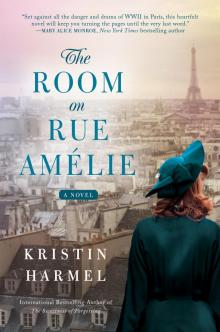 The Room on Rue Amélie
The Room on Rue Amélie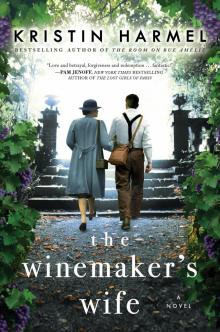 The Winemaker's Wife
The Winemaker's Wife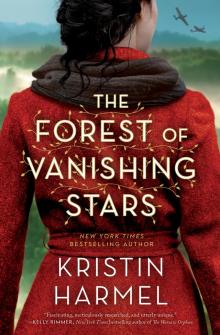 The Forest of Vanishing Stars
The Forest of Vanishing Stars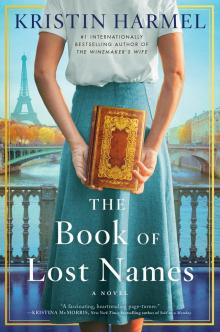 The Book of Lost Names
The Book of Lost Names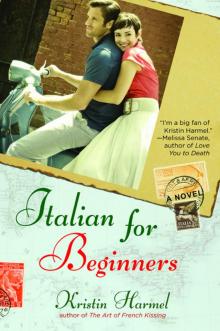 Italian for Beginners
Italian for Beginners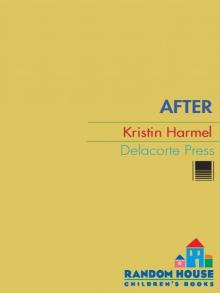 After
After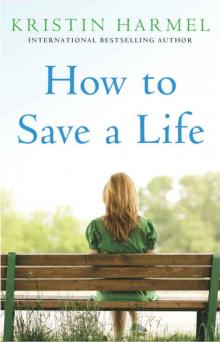 How to Save a Life
How to Save a Life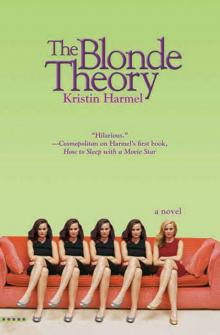 The Blonde Theory
The Blonde Theory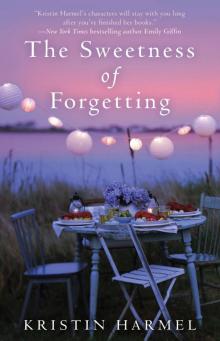 The Sweetness of Forgetting
The Sweetness of Forgetting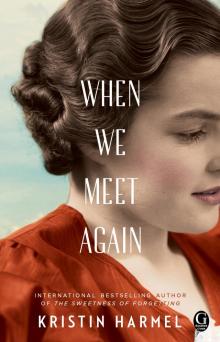 When We Meet Again
When We Meet Again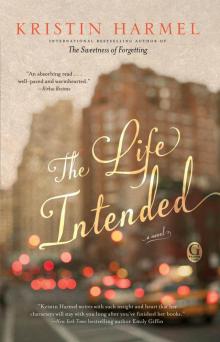 Life Intended (9781476754178)
Life Intended (9781476754178)